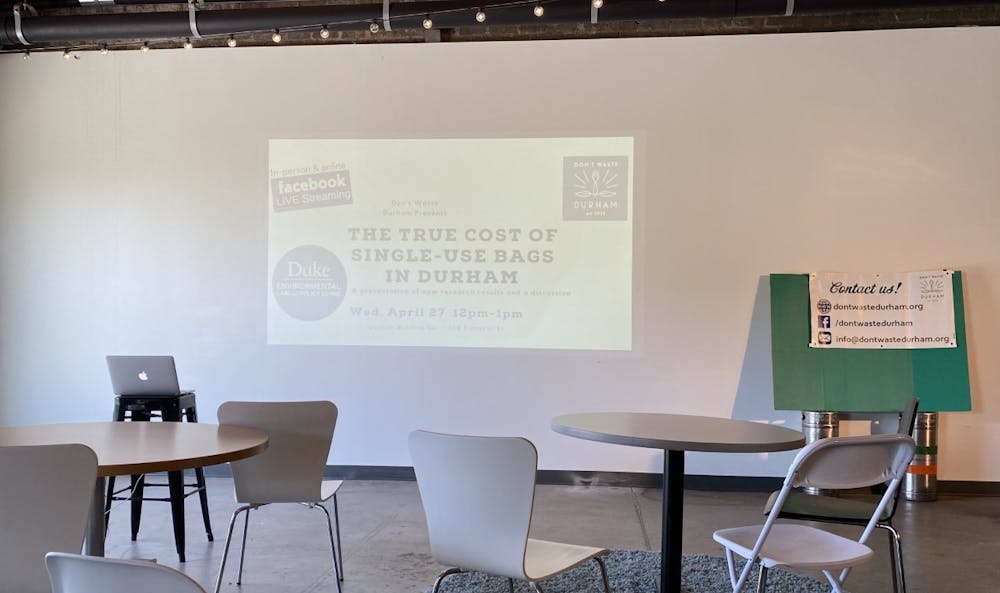Local nonprofit Don’t Waste Durham and the Duke Environmental Law and Policy Clinic discussed research about their single-use bag fee proposal and a Durham litter survey in a Wednesday event at the Durham Bottling Co. The proposal would implement a 10 cent fee on paper and plastic bags in hopes of reducing disposable bag usage.
The talk, titled, “The True Cost of Single-Use Bags in Durham,” started with a presentation from Crystal Dreisbach, founder and CEO of Don’t Waste Durham. Dreisbach highlighted takeaways about disposable bags from research conducted with the Environmental Law and Policy Clinic over the past two years. A white paper on Don’t Waste Durham’s website writes that single-use bags contribute to “litter on streets and in waterways, clog storm drains, take up limited landfill space and wreak havoc on recycling infrastructure.”
In particular, Dresibach noted that toxins from single-use bags are increasing in Durham. She pointed to Jordan Lake, a main drinking water reservoir for South Durham.
“[Jordan Lake] has off the charts single-use plastic filaments which come from the breakdown of single-use plastic bags,” Dreisbach said. “The longer we wait to do something, the higher these plastic filaments go up.”
Dreisbach further stated that single-use bags have been linked to environmental justice and racial equity issues. She said that around 400 cities have placed regulations on single-use bags and that bag fees have proven effective in reducing disposable bag usage.
Next, Isabel Bukovnik, a third-year graduate student at the Nicholas School of the Environment, discussed her work on the Environmental Law and Policy Clinic’s first-ever Durham litter survey.
Bukovnik first gave background on past work Don’t Waste Durham and the clinic have achieved together. Don’t Waste Durham became a client of the clinic in January 2019. In July 2019, the partnership proposed the bag fee ordinance to Durham’s Environmental Affairs Board.
“[The board was] very supportive of the fee, but one of the things they suggested was we take a closer look into the equity issues that might be present with a fee on single-use bags,” Bukovnik said.
Bukovnik then discussed how plastic waste is handled in Durham. She said that Durham generates 344,000 tons of waste per year, 620 tons of which is plastic bags. This waste is placed in a landfill in Sampson County and disproportionately affects people of color, according to Bukovnik.
“If you zoom in on the area directly around the landfill, the people that are experiencing these truckloads everyday, the smells, the litter that blows off of the landfill, the buzzards that are constantly circling over them, nine out of 10 of those people are people of color,” Bukovnik said.
Hoping to dig deeper into exploring these patterns of environmental injustice, the clinic developed the Durham Litter Map project, the first-ever litter survey of Durham. The project sent out volunteers to Durham and had them map the streets of Durham based on litter density. They rated the streets on a scale from one to four, one being no litter and four being “so much litter that it would require an intervention and special equipment to come clean that up,” according to Bukovnik. Volunteers then input these numbers in an app that color-codes a map of Durham’s streets based on their litter density score.
The project is ongoing and has mapped 3,800 of Durham’s 5,000 street segments. So far, this initial data has indicated a strong positive correlation between historically redlined districts and litter density.
Prior studies done by the clinic have indicated that much of this litter is plastic. According to Nancy Lauer, staff scientist at the Environmental Law and Policy Clinic, up to 70% of what Don’t Waste Durham and the clinic picked up during cleanups are plastics.
“The burden of litter in our community is not shared equally. Certain areas experience much heavier litter than other areas. When we look at where those areas that experience litter are situated, we find a direct correlation with historical discriminatory housing practices,” Bukovnik said. “Litter and waste disposal is an equity issue and should be treated as an equity issue.”
Get The Chronicle straight to your inbox
Signup for our weekly newsletter. Cancel at any time.

Ayra Charania is a Trinity junior and a senior editor of The Chronicle's 118th volume.

